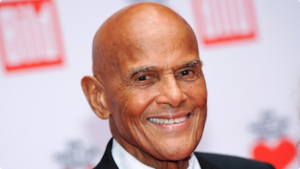
Harry Belafonte
Harry Belafonte was born on this date in 1927. He was a Black entertainer and activist.
Harold George Belafonte, Jr., was born in New York City; his parents were from the Caribbean. Both his parents were from Jamaica. In his autobiography, he explained how he came by Belafonte, a derivative of Belinfanti. His parents, Harold Sr. and Melvine, were not legal residents and varied the spelling to evade the immigration authorities. His father worked on boats that sailed between the Caribbean and the USA.
In 1919, at the age of 20, he sailed as a "Crew/Busboy" to Boston on the Brighton. Before that, he sailed on the Jose from Port Antonio, Jamaica, to New York. These were banana boats that also carried passengers. When Belafonte was eight, his mother sent his brother Dennis to boarding school in Jamaica. He stayed there until high school when the family moved back to New York City.
Belafonte attended George Washington High School, where he was on the track team. He dropped out of school at age 17 and joined the United States Navy. In 1945, after completing his service, he returned to New York City and became a maintenance worker. As a tip, someone gave him tickets to a play. Belafonte was fascinated by the theater. He began volunteering as a stagehand with the American Negro Theater (ANT) and decided he wanted to be an actor. Belafonte studied acting and performed with the ANT. He landed a singing role in a play, and his audience discovered his great singing voice. Soon, he started singing jazz and pop songs professionally in nightclubs, but he did not like it.
At about the same time, he began to find meaning in folk music. On weekends, he’d go to Washington, D.C., where he studied African American folk music from the collections at the Library of Congress. Belafonte also learned music from the Caribbean. Singing at New York’s Village Vanguard led to his album "Calypso," the first album of its kind ever to sell over a million copies. It started a calypso music craze in the United States. Belafonte made several other successful recordings as his acting career began to take off. In 1954, he got a role in the movie "Carmen Jones," where the entire cast was African American. Belafonte also produced movies and shows. He became the first African American television producer and won an Emmy Award for his show "Tonight with Harry Belafonte."
He wanted his work to promote both racial equality and racial harmony. He won a Tony Award in 1954 for John Murray Anderson’s Almanac. Belafonte’s film acting credits include: "Island in the Sun" in 1957, "Odds Against Tomorrow" in 1959, "Buck and the Preacher" in 1972, "Uptown Saturday Night" in 1974, and "Kansas City" in 1996.
When Belafonte began his career, life was hard for Black entertainers. Blacks worked in theaters and hotels. But segregation meant blacks could not stay in the same hotels as other Whites, eat in the restaurants in those hotels, or even socialize with their friends. Belafonte was once denied an apartment in New York City because he was black. So he bought the whole building. Racist conditions incited Belafonte to play a continuous role in getting racial barriers removed.
In the 1960s, he was involved in the American Civil Rights Movement and helped many people worldwide. In 1985, he produced and sang a Grammy-winning song called "We Are the World." Proceeds from the song benefited the starving people in Ethiopia. Two years later, he became the goodwill ambassador for UNICEF, the United Nations Children’s Fund.
Belafonte supported Martin Luther King Jr. so much that he even began contributing money to the then-cash-strapped King's family. He used his wealth to feed and clothe the King, hire secretaries and nannies, and even take out a life insurance policy on King, payable to Coretta (King's wife) upon his death.
In 1988, the Peace Corps gave him its Leader for Peace Award. Twenty percent of his income goes to the Belafonte Foundation of Music and Art, which helps young Black people study for careers in the arts. He also heads a group called the Urban Peace Movement.
Belafonte produced a five-CD set called "The Long Road to Freedom: An Anthology of Black Music." It features African American music and music from Africa dating as early as the 1600s. He received the National Medal of the Arts in 1994 and the Grammy Award for Lifetime Achievement in 2000. Currently, Belafonte is still entertaining and working for quality causes. On October 8, 2002, Belafonte made news after publicly criticizing Secretary of State Colin Powell. He compared Powell’s George W. Bush administration to a slave out to please his master.
Harold George Belafonte, Jr., died on April 25, 2023, at 96.